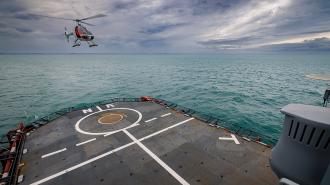French aerospace behemoth Airbus has successfully tested their autonomous helicopter at sea, in conditions which mimic what the unpiloted aircraft will face when fully deployed. The helo, called the VSR700, completed 80 takeoffs and landings off the coast of Brittany, the company announced — all of them autonomously.
“This flight test campaign was an important step for the VSR700 programme as it allowed us to validate the excellent performance of the drone in operational conditions, which were representative of its future missions,” Nicolas Delmas, head of the VSR700 program for Airbus Helicopters, said in a statement.
Conducted along with the French Armament General Directorate — which procures weapons and technologies for France’s armed forces — and the French commune of Marignane, the test was the first time the autonomous helicopter flew in the same configuration it would for actual operations.
The VSR700 was designed to work alongside modern navies, Airbus says; it is made to be small enough for stealth, but with the ability to carry high-end sensor arrays. The autonomous helicopter will primarily carry out “intelligence, surveillance, targeting, and reconnaissance,” as well as locating submarines and enemy vessels, freeing up piloted helicopters for other tasks.
While designed for the military, the VSR700 tests took off from a civilian ship outfitted with a helicopter deck. The VSR700 used Airbus’ DeckFinder system to identify its landing pad without any navigational signals like GPS and regardless of visual conditions, the company said. DeckFinder uses a suite of six sensors placed around the landing zone and three airborne sensors to guide unpiloted aircraft back home, with an accuracy of 3 to 7 inches.
In the air for eight hours, across 14 flights, the autonomous helicopter tackled numerous weather conditions, including winds over 40 knots — considered “strong gale” conditions, where seas can reach 20 to 30 feet. Human pilots would not take flight in such winds, Interesting Engineering noted.
We’d love to hear from you! If you have a comment about this article or if you have a tip for a future Freethink story, please email us at tips@freethink.com.
